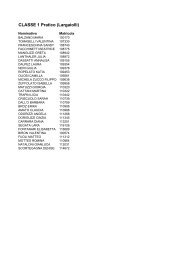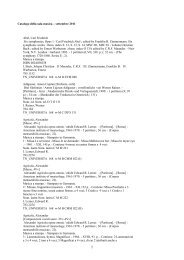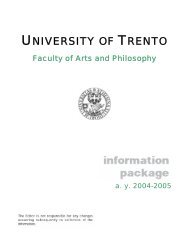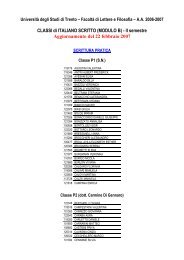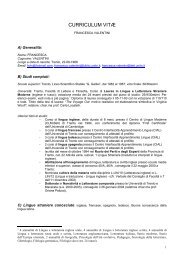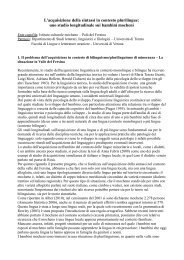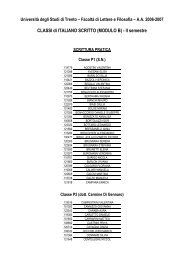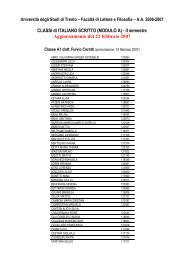PISA Under Examination - Comparative Education Society in ...
PISA Under Examination - Comparative Education Society in ...
PISA Under Examination - Comparative Education Society in ...
Create successful ePaper yourself
Turn your PDF publications into a flip-book with our unique Google optimized e-Paper software.
M.A. PEREYRA, H. KOTTHOFF AND R. COWEN<br />
The third part of this volume entitled “The assessment of <strong>PISA</strong>, School<br />
Effectiveness and the Socio-cultural Dimension” focuses on the assessment of<br />
<strong>PISA</strong> and the question if and <strong>in</strong> which ways we can deduce policy action from this<br />
k<strong>in</strong>d of research for educational policy, school improvement and school efficiency.<br />
The authors analyse the assessment of <strong>PISA</strong> on different levels and from different<br />
discipl<strong>in</strong>es, <strong>in</strong>clud<strong>in</strong>g, <strong>in</strong> the last paper, the economics of education perspective.<br />
While most papers discuss the possible consequences of the <strong>PISA</strong> results on the<br />
systems level, one paper focuses on the student’s perspective by ask<strong>in</strong>g how<br />
<strong>in</strong>dividual socio-economically disadvantaged students react to <strong>PISA</strong> tests and<br />
engage <strong>in</strong> the process of test<strong>in</strong>g.<br />
In the first paper Kathar<strong>in</strong>a Maag Merki exam<strong>in</strong>es the effects of external<br />
achievement tests on teach<strong>in</strong>g quality. S<strong>in</strong>ce changes <strong>in</strong> the teach<strong>in</strong>g quality which<br />
are the result of the participation <strong>in</strong> <strong>in</strong>ternational comparative achievement studies<br />
cannot be <strong>in</strong>vestigated <strong>in</strong> the framework of the <strong>PISA</strong> studies, Maag Merki analyses<br />
to what extent external state-wide exit exam<strong>in</strong>ations have an effect on the teach<strong>in</strong>g<br />
quality <strong>in</strong> maths and English <strong>in</strong> the f<strong>in</strong>al year of upper secondary education <strong>in</strong> the<br />
German Gymnasium. Follow<strong>in</strong>g the below average performance of the German<br />
education system <strong>in</strong> earlier <strong>PISA</strong> studies (2000, 2003, 2006), all 16 states <strong>in</strong>troduced<br />
state-wide Abitur exit exam<strong>in</strong>ations unless they had not already <strong>in</strong>stituted them<br />
earlier (e.g. Bavaria, Baden-Württemberg). In her longitud<strong>in</strong>al empirical study<br />
Maag Merki focuses on two German states: Bremen which <strong>in</strong>troduced state-wide<br />
Abitur exit exam<strong>in</strong>ations <strong>in</strong> some advanced-level courses (e.g. English and Maths)<br />
<strong>in</strong> 2008 and the German state of Hesse, <strong>in</strong> which state-wide exit exam<strong>in</strong>ations have<br />
been <strong>in</strong>troduced <strong>in</strong> all subjects <strong>in</strong> 2007. Compar<strong>in</strong>g the teach<strong>in</strong>g quality before and<br />
after the <strong>in</strong>troduction of state-wide exit exam<strong>in</strong>ations led, accord<strong>in</strong>g to Maag<br />
Merki, to the follow<strong>in</strong>g results: “the <strong>in</strong>troduction of state-wide Abitur exit exam<strong>in</strong>ation<br />
<strong>in</strong> advanced English and maths courses <strong>in</strong> Bremen was accompanied by an<br />
improvement <strong>in</strong> <strong>in</strong>structional quality <strong>in</strong> those courses” (p. 131). These positive<br />
effects on <strong>in</strong>structional quality rema<strong>in</strong> stable over time and can be found aga<strong>in</strong> <strong>in</strong><br />
2009. In contrast to Anglo-American empirical f<strong>in</strong>d<strong>in</strong>gs on the question of the<br />
impact of external achievements tests on the teach<strong>in</strong>g quality, negative consequences<br />
could not be observed at this early stage. The ma<strong>in</strong> reason for this difference could<br />
be, accord<strong>in</strong>g to Maag Merki, that the German Abitur exit exam<strong>in</strong>ations must be<br />
characterized – <strong>in</strong> <strong>in</strong>ternational comparison – as low-stakes assessment, which<br />
“allow teachers more room to employ functional approaches that can be tailored to<br />
students’ needs” (p. 132).<br />
The second paper by Gerry MacRuairc moves from the macro-level analysis to<br />
the students’ perspective on <strong>PISA</strong> test<strong>in</strong>g. While the high level of correlation<br />
between educational atta<strong>in</strong>ment and the socio-economic background of the students<br />
is empirically well established, Mac Ruairc wants to analyse <strong>in</strong> his study how<br />
<strong>in</strong>dividual socio-economically disadvantaged students react to tests and engage <strong>in</strong><br />
the process of test<strong>in</strong>g. In order to do that, “it is”, accord<strong>in</strong>g to Mac Ruairc,<br />
“important to take on board the perspectives of <strong>in</strong>dividual students themselves” (p.<br />
135). By exam<strong>in</strong><strong>in</strong>g the views of students on <strong>PISA</strong> test<strong>in</strong>g <strong>in</strong> one case study the<br />
author provides an <strong>in</strong>sight <strong>in</strong>to how the <strong>PISA</strong> assessment (2009) was experienced<br />
8




